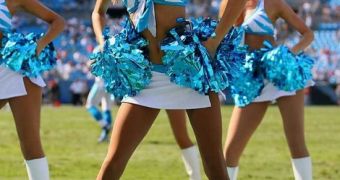They’re definitely a pleasure to look at but you can only guess the kind of hard work that goes into every routine cheerleaders carry through on the field. In fact, cheerleading is even more dangerous than you might have thought, with the number of cases of severe injuries and even death going up in recent years.
Right now, cheerleading or competitive cheering is the most dangerous sport among US women, researchers have found, as The Telegraph reports.
Oddly enough, it’s also gaining in popularity, regardless of the risks.
It often leads to severe injuries, paralysis, and even death but, to make matters even worse, sometimes the injuries are not even reported, which can cause bigger complications in time.
Of the 3.6 million people who take part in cheerleading in the US right now, only a meager 4 percent is represented by boys.
“Researchers found that the number of visits to casualty resulting from high school and college cheerleading injuries rose from 4,954 in 1980 to 26,786 in 2007,” The Telegraph writes of the findings of the study published in the Journal of Pediatrics.
Of this number, 66 percent is represented by “catastrophic” injuries, described as such because they result in “permanent disability or medical conditions.”
Over the last 30 years, there have been over 110 cases of head and spine injuries resulting in “permanent brain injury, paralysis or death,” and countless cases of heat stroke and heart problems.
As odd as it might sound, researchers have determined that the most horrific injuries are not sustained by the cheerleaders thrown in the air during certain parts of the routine, but by those on the ground, whose responsibility is to catch them.
However, a serious reason for concern for researchers is the fact that cheerleaders are still considered entertainers and not athletes in many a US state.
This means that they can get back on the field after a concussion as soon as they say they’re ok, which usually happens right afterwards. Considering cheerleading a sport would mean more thorough checkups which, in turn, would diminish the risks of further injury.

 14 DAY TRIAL //
14 DAY TRIAL //